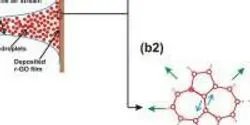News

Less than a year after patenting a process that could improve stripping greenhouse gasses from industrial emissions, a University of Alabama engineering professor was recently granted another patent that uses a different solvent to accomplish the same goal.

Researchers at the Georgia Tech Research Institute are developing a micro gas chromatograph for early detection of diseases in crops.

Equipment unique to the University of Calgary gives researchers insight into industry and academic challenges.

A simple, inexpensive spray method that deposits a graphene film can heal manufacturing defects and produce a high-quality graphene layer on a range of substrates, report researchers at the University of Illinois at Chicago and Korea University.

Ferroelectric materials–substances in which there is a slight and reversible shift of positive and negative charges–have surfaces that are coated with electrical charges like roads covered in snow. Accumulations can obscure lane markings, making everyone unsure which direction traffic ought to flow; in the case of ferroelectrics, these accumulations are other charges that “screen” the true polarization of different regions of the material.















